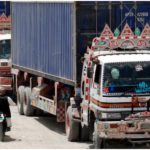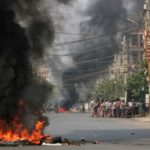The United States and the Taliban reached a political agreement in February 2020. The purpose of the agreement was to reach a political solution and reduce the US military presence in Afghanistan. On the other hand, the agreement will pave the way for peace talks between the Afghan government and the Taliban to bring about a lasting peace and an end to decades of violence. But the process still faces challenges such as the release of all Taliban prisoners held by the Afghan government, as well as the release of Afghan soldiers held as a captive by the Taliban, whose release has already been cited as a key precondition for the primary talks, which paves the way for the next steps toward starting intra- Afghan dialogue.
The formation of a negotiating team from both sides is also one of the important issues that should be addressed as soon as possible. Therefore, in this article, in order to provide realistic and practical solutions, we will first briefly remind the existing challenges to Afghanistan’s peace process and then, will present the desired solutions in the short and strategic term. Providing suggestions and creating a suitable atmosphere for successful talks to reach a secure political solution and accepted by all parties, will be other parts of the article which will separately addressed. But first, the causes and factors of the delay in the talks must be reminded. The current peace process, which in several cases has led to the delay of peace talks and has posed a major challenge to this process, are as following:
- Deep ideological contrast between the Afghan government and the Taliban: The Afghan government, in view of decades of violence, considers the current achievements, which are the result of twenty years of active presence of the international community, important and strives to use the existing political system as a “Republic”, protecting the political structure accepted by all of Afghanistan. While the Taliban, based on their own thinking, want to change the political system from the republic to the emirate. In the system of the Emirate, the right to vote and self-determination, which are among the basic rights of citizens, are taken away and the situation is such that the Emir of the Emirate is the sovereign owner of the country and is accountable to no authority. There is no separation of powers and the limits of competence are not clear.
- Lack of independence by the Taliban in the negotiation process to conclude the talks: The Taliban in the negotiation process, like the Afghan government, do not have sufficient authority to decide on important issues. The countries that support them have each taken full authority from the group, taking into account their own interests, which on the one hand has challenged the peace process and on the other hand has delayed the peace negotiations.
- Conflicting interests of countries in the region and the world in the peace process: Different countries pursue different interests. Conflicts of interest and the development of the situation from proxy war to proxy peace have made it difficult for peace negotiations to succeed. This conflict of interests has various roots, from intellectual differences to economic and political interests.
- Lack of political consensus within Afghan society: The Afghan government and its supporting groups, political parties and movements are largely unanimous in securing peace in Afghanistan, but they face serious differences with the Afghan government in how to achieve it. According to the Afghan government opposition, the Afghan government is only seeking the interests of its intergroup and has remained indifferent to the interests of the majority. This has created tensions between the Afghan government and its political rivals.
- Early announcement of the withdrawal of foreign troops from Afghanistan: This has led the Taliban, including its leadership, to conclude that the withdrawal of US troops, as the strongest supporter of the Afghan government, is a good opportunity to seize the power by force and by doing so wait and by time, which itself has delayed peace talks because, they think that the Afghan government will fall quickly after their withdrawal and there is no need to hold peace talks. That is to say, the tactic of the Taliban is to pave the way for power seizing through military pressure. Historical experience, on the other hand, shows that such calculations are only appropriate in a particular time frame. Accordingly, the agreement to release 5,000 prisoners from the Afghan government’s prisons is contained in the text of the agreement between the United States and the group.
Challenges that have slowed this process:
There seem to be a number of complex factors involved in the failure of the peace process in Afghanistan that have slowed the process and prevented the start of peace talks, some of which are mentioned below. If the factors are not taken care of and the obstacles are not removed, the peace process will not lead to a practical result, at least in the short term:
1- Non-nationalization of peace talks: The truth is that Afghan politicians and currents; involved in the country’s affairs have different, and even contradictory views on the peace process and there is no political consensus on how to negotiate. There is no rate of participation of the armed opposition in the political process, how to deal with the crimes and actions committed by armed opposition, and so on. In addition, the people have been left out in the peace process and it is clear that this trend has taken ethnocentric, project-oriented, instrumentalist and … approaches. There is no doubt that peace in Afghanistan is unimaginable until the peace process in the country is not nationalized and a comprehensive consensus is reached.
- Foreign Involvement: As the Afghan government has repeatedly stated, and in particular President Ghani has repeatedly and explicitly spoken of foreign interference in the process, current events in Afghanistan confirm that the peace process and the security process in Afghanistan depend on the countries that have the greatest interests in Afghanistan and need insecurity as an excuse to be present and intervene in the region. The secret meetings of the intelligence agencies of some foreign countries with the representatives of the Taliban show that there are many hands behind the insecurities in Afghanistan with different motives and goals, and it does not seem that the peace process will get out of this situation.
3- Contradictory policies of the government: The release of Taliban commanders from prison who are accused of war, assassination, terror and terrorism, and the non-implementation of laws on militant and disruptive security groups, has led to ruthless armed opposition to continue their operations against the people and the security forces of the country, and on the other hand, to threaten and attack the security of the society in every sense. Prior to the release of Taliban prisoners, there were many assumptions that many commanders and members of armed opposition groups who, as soon as they are released from prison, resume destructive actions and kill Afghan citizens, and this process, in addition to causing despair and frustration of the country’s security forces in the fight against, which came true. Based on statistics, recently released show that almost 60% of the released prisoners of Taliban, have returned to battlefield to resume their fighting against the Afghan government. It has made the people pessimistic and distrustful of government policies, and undermining the government’s position in the peace process.
4- Peace process and extortionist groups: Experts believe that various groups and spectrums have attacked and threatened the process of stability and security in Afghanistan; Drug-related groups, Taliban remnants, military affiliates in the region, as well as individuals and groups who seize the opportunity to blackmail the government by creating insecurity. Through this, they have achieved great political and economic benefits. It is said that those who have joined the peace process in recent years are mostly related to such currents, which are in collusion and conflict with profiteers within the government apparatus.
5-Ignoring Afghanistan’s economic trend: Afghanistan is the fifth poorest country in the world; Corruption, war, illiteracy, wrong economic policies, etc. have been among the factors that have hindered the repair and reconstruction of the destroyed economic infrastructure of the country for more than four decades, and after twelve years of the new shift in Afghanistan, with billions of dollars in cash flowing in, is still struggling with a bad economic situation and is expected to worsen in the coming years. Fleeing of thousands of young people to different countries over the past decade as illegal migrants is a sign of poor economic conditions and disregard for the economy, which has ultimately thwarted security efforts, regardless of influential factors, including the economic factor.
6- Multiplicity and nature of the goals of the armed opposition groups: The armed opposition groups in Afghanistan have different multiple forms, which have finally taken up arms in the form of armed groups with the aim of achieving their demands in Afghanistan. The physical multiplicity of these groups, in fact, reflects the multiplicity and even the contradiction of their demands, and even the internal differences and conflicting goals that these groups pursue are themselves a major obstacle to the conclusion of the peace process in Afghanistan; Numerous internal conflicts of armed opposition groups in Afghanistan and their non-adherence to a single trend towards the situation in this country show that in order to achieve peace with each of these groups and with a separate process and approach, it must be resolved; This is very difficult and fragile.
7- existence of foreign fighters and taking the peace process as hostage: Various people from Central Asia, Europe, Pakistan, Arab countries, Africa, etc. are fighting in the ranks of armed opposition groups against the Afghan government, the most prominent of which are members of al-Qaeda and the Pakistani Taliban. In addition to pursuing the idea of jihad in Afghanistan, these groups are aware of the geopolitical importance of Afghanistan and are trying to use Afghanistan’s fragile situation as a bulwark against other parts of the world; The statements of some Afghan leaders of the armed opposition also show that in fact a large part of the Afghan peace process is in the hands of foreign members of the armed fighters and these people are preventing peace talks between Afghan armed opposition groups and the government.
Recommendations
But what is the solution, with what solutions can these problems be overcome and peace and stability achieved? Given the challenges and opportunities in the peace process, future solutions will be effective and useful in both the short and long term.
- Efforts must be made to preserve the achievements of the last 19 years, which form the basis of the existing political system and its legitimacy. A constitution like a national guarantee that legitimizes the basis of a government’s actions. Freedom of the press, which is an essential element of a democratic system, the legal rights and freedoms of women, including the right to education and employment, are very important. Elections and active participation in political processes, which is the legitimate right of every citizen, are also worth mentioning.
- Emphasis on important national issues that protect the health of Afghanistan, that of territorial integrity, political system, strengthening the political system that represents all people. Creating a better environment for peaceful coexistence in the light of national values, etc., which is important for every single Afghan.
- The strict supervision of the United Nations and the members of the international community who observe and guarantee this process should be implemented and the change of the bilateral mechanism to multilateral is to ensure and strengthen of this process, seems very necessary. By creating a clear and inclusive mechanism that determines the future of these talks, these recommendations are important for the continuation and survival of a peaceful and prosperous Afghanistan. Otherwise, there is no guarantee of success for this process.













